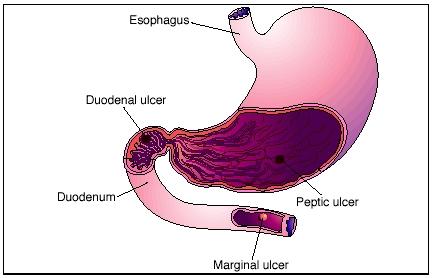Ulcers - Treatment
Many symptoms of ulcers can be treated with over-the-counter medications. These medications may relieve the pain, nausea, and general discomfort caused by ulcers. However, they do not cure the disorder.

Two other types of medications are designed to reduce the symptoms of ulcers. Antisecretory drugs are drugs that reduce the amount of acid produced in the stomach. Acid attacks mucous membranes and can produce ulcers, so by lowering the amount of stomach acid released, the risk of ulcer formation can be reduced.
Protective drugs are also used to treat ulcers. A protective drug is a substance that forms a thin lining over mucous membranes, which protects the mucous membranes from attack by stomach acid.
Surgery is generally not used to treat ulcers. However, some of the complications caused by ulcers may require surgery. For example, doctors may cut the vagus nerve to the stomach. The vagus nerve (pronounced VAY-guhss) controls the release of stomach acid. After the cut, less stomach acid will be released, thus reducing the risk of ulcer formation.
One direct method for treating ulcers is to kill the bacteria that is responsible for most the vast majority of deaths caused by ulcers. Unless these bacteria are eliminated from the digestive system, ulcers will come back again and again. The drug used to kill Helicobacter pylori is the antibiotic tetracycline (pronounced tet-ruh-SI-kleen).
Alternative Treatment
Herbalists believe that a variety of natural products can help heal ulcers. For example, they recommend raw cabbage juice to help heal an ulcer. Some herbs that may soothe the symptoms of ulcers include plantain, marsh mallow, slippery elm, geranium, and goldenseal. Nutrition experts recommend taking certain vitamins and minerals, including vitamins A, C, and E, and the minerals zinc and selenium.

Comment about this article, ask questions, or add new information about this topic: